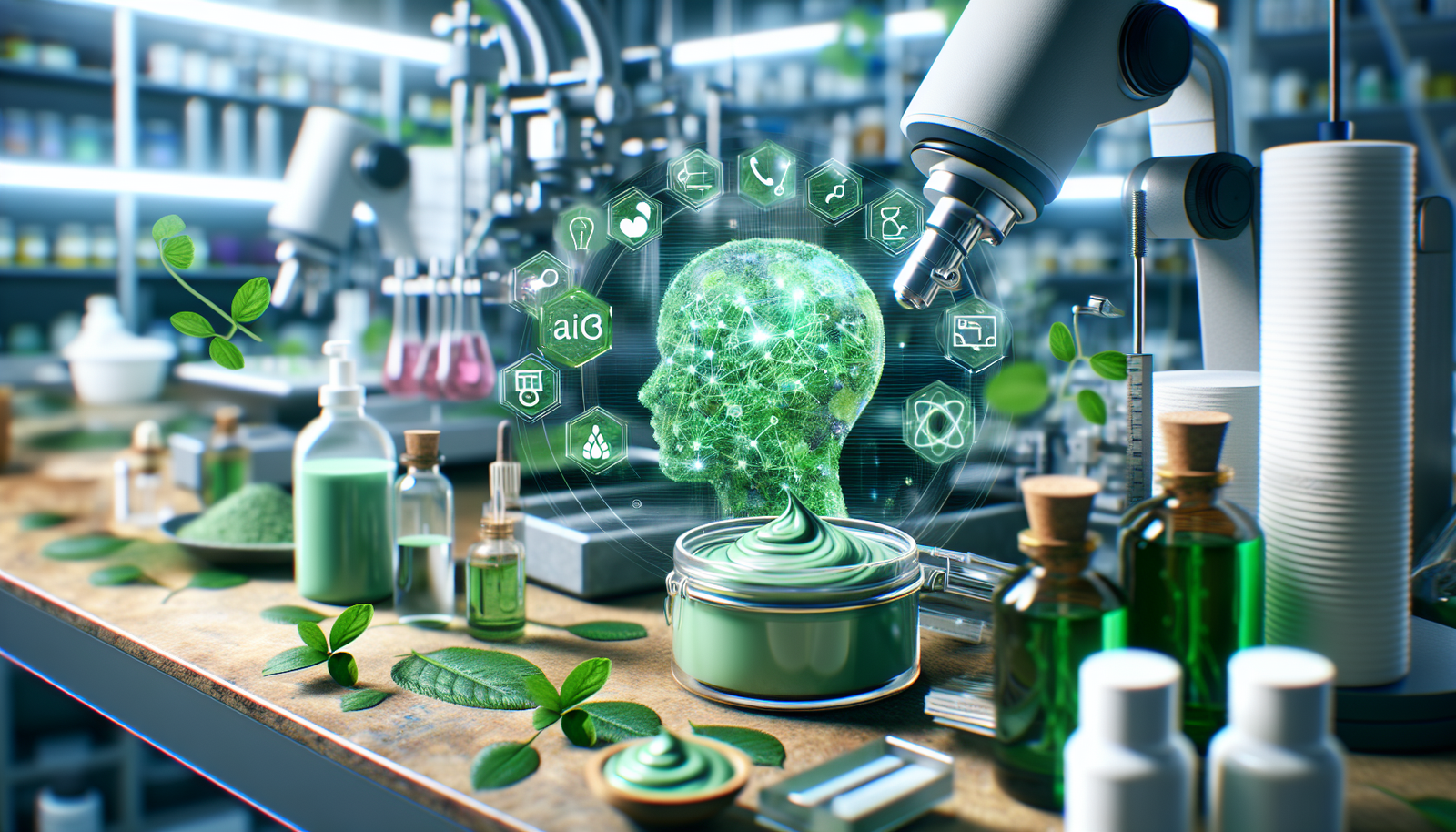Understanding Sustainable AI
Sustainable AI refers to the application of artificial intelligence technologies in ways that prioritize environmental consciousness and social responsibility. In the cosmetics industry, sustainable AI is being leveraged to create more eco-friendly formulations, optimize resource use, and minimize environmental impact. By integrating AI-driven solutions, companies can significantly reduce their carbon footprint while still delivering high-quality products. This not only benefits the environment but also aligns with the growing consumer demand for sustainable products.
One of the key areas where sustainable AI is making a difference is in formulation development. AI algorithms can analyze vast datasets to identify the most sustainable and effective ingredients, cutting down the reliance on synthetic chemicals. This leads to the creation of products that are gentler on both the skin and the planet. For instance, AI can predict how different ingredient combinations will interact, helping chemists formulate products with minimal waste and environmental impact. This process is more efficient than traditional methods, which often involve trial and error, leading to significant amounts of wasted materials.
Another important aspect of sustainable AI is its role in reducing packaging waste. AI technologies can help design packaging that uses fewer materials while still protecting the product effectively. By analyzing data on material durability and consumer usage patterns, AI can assist in creating innovative packaging solutions that are both functional and sustainable. This not only reduces the amount of plastic and other non-biodegradable materials used but also lowers the overall environmental footprint of cosmetic products.
Furthermore, sustainable AI enhances supply chain transparency by tracking and analyzing each step of the production process. AI systems can monitor resource consumption, emissions, and other environmental metrics, providing companies with detailed insights into their operations. This allows brands to identify inefficiencies and areas for improvement, ensuring that all stages of production are as sustainable as possible. As a result, companies can make informed decisions that contribute to a more sustainable future for the cosmetics industry.
AI-Driven Eco-Friendly Formulations
AI-driven eco-friendly formulations are revolutionizing the cosmetics industry by enabling the creation of products that are both effective and sustainable. The integration of artificial intelligence in this sector allows for precise ingredient selection, minimizing the environmental impact of cosmetic products. By analyzing vast datasets, AI can identify sustainable alternatives to traditional ingredients, ensuring that formulations meet both consumer demands and environmental standards. This approach not only enhances the product’s efficacy but also ensures that it aligns with eco-friendly practices.
One of the key advantages of using AI in formulating cosmetics is the ability to streamline the development process. AI algorithms can sift through extensive ingredient databases to find combinations that are not only sustainable but also safe and effective. This reduces the reliance on animal testing and lowers the carbon footprint associated with traditional research and development methods. Additionally, AI can predict consumer responses to new formulations, allowing companies to tailor products to specific market needs while maintaining sustainability.
AI also plays a crucial role in optimizing the production process to further minimize waste. By analyzing production data, AI systems can identify inefficiencies and suggest improvements, leading to reduced resource consumption and lower emissions. Moreover, AI-driven formulations can be designed to use biodegradable or recyclable materials, promoting a circular economy within the cosmetics industry. The incorporation of AI in the development of eco-friendly formulations not only addresses environmental concerns but also meets the growing consumer demand for sustainable products.
In summary, the use of AI in creating eco-friendly formulations represents a significant advancement in the cosmetics industry. Through intelligent ingredient selection, efficient production processes, and waste reduction strategies, AI is paving the way for a more sustainable future. As the industry continues to evolve, AI-driven innovations will likely become a cornerstone of eco-friendly cosmetic product development, benefiting both the environment and consumers.
Reducing Waste with AI
Sustainable AI is playing a pivotal role in reducing waste within the cosmetics industry. By leveraging advanced algorithms and machine learning, companies can optimize their production processes, ensuring minimal waste generation. AI systems analyze data from various stages of production to identify inefficiencies and suggest improvements. This results in a more efficient use of resources, ultimately leading to significant cost savings and a reduction in environmental impact. For example, AI can predict demand more accurately, allowing manufacturers to produce only what is needed and avoid overproduction.
One of the key ways AI contributes to waste reduction is through smart formulation. By analyzing the chemical composition and environmental impact of different ingredients, AI can recommend alternative eco-friendly ingredients that achieve the same results. This not only reduces the use of harmful substances but also minimizes the amount of waste generated during the production process. Furthermore, AI-driven formulations can be optimized to use less water and energy, contributing to a more sustainable production cycle.
AI also enhances waste management by improving packaging solutions. Through data analysis, AI can suggest sustainable packaging materials and designs that reduce waste and improve recyclability. This is crucial in an industry where packaging contributes significantly to environmental waste. Additionally, AI can monitor supply chains, providing transparency and enabling companies to track waste generation at every step. This transparency supports better decision-making and allows companies to implement more sustainable practices.
| AI Application | Impact on Waste Reduction |
|---|---|
| Demand Prediction | Reduces overproduction by aligning manufacturing with accurate market needs |
| Smart Formulation | Identifies eco-friendly ingredients, reducing chemical waste |
| Packaging Optimization | Suggests sustainable materials, minimizing packaging waste |
| Supply Chain Transparency | Enables tracking and reduction of waste throughout the supply chain |
AI in Sustainable Packaging
Artificial Intelligence (AI) is revolutionizing the cosmetics industry by introducing innovative approaches to sustainable packaging. The shift towards eco-friendly packaging is not only a response to consumer demand for greener products but also a crucial step in reducing the environmental impact of the industry. AI technologies are being employed to design packaging that minimizes waste while maintaining product integrity. By analyzing vast amounts of data, AI systems can identify the most sustainable materials and optimize the packaging design process.
One of the key contributions of AI in sustainable packaging is the ability to predict material performance. AI algorithms can simulate various environmental conditions to test the durability and biodegradability of packaging materials. This predictive capability ensures that the selected materials will withstand real-world conditions, enhancing their sustainability. As a result, companies can reduce the amount of packaging waste that ends up in landfills, thus contributing to a circular economy.
Moreover, AI is instrumental in enhancing supply chain transparency, particularly in tracking and optimizing the use of sustainable packaging materials. AI-powered analytics provide insights into the entire lifecycle of packaging materials, from sourcing to disposal. This data-driven approach enables companies to make informed decisions about their packaging strategies, ensuring they align with sustainability goals. For instance, AI can recommend the use of recyclable or biodegradable materials based on environmental impact assessments.
Finally, AI facilitates the customization of packaging designs to cater to diverse consumer preferences while maintaining sustainability. By leveraging AI algorithms, brands can create personalized packaging solutions that use minimal resources. This not only enhances consumer satisfaction but also reduces the carbon footprint associated with production and transportation. The integration of AI in sustainable packaging exemplifies the potential of technology to drive eco-friendly innovations in the cosmetics industry.
Ethical Sourcing and AI
Ethical sourcing is a critical component of sustainability in the cosmetics industry, ensuring that ingredients are obtained in a way that respects both the environment and the communities involved in production. Artificial Intelligence (AI) is playing a pivotal role in transforming how companies approach this challenge. By leveraging AI technologies, cosmetic brands can effectively track the origin of their raw materials, ensuring they adhere to ethical standards and reduce their ecological footprint.
AI systems can analyze extensive data sets to identify trends and patterns that would be challenging to discern manually. This capability allows companies to pinpoint areas where their supply chains may fall short of ethical standards. With AI, brands can implement predictive analytics to foresee potential ethical issues before they arise, enabling proactive measures. Consider a scenario where AI algorithms analyze supplier data to ensure compliance with fair trade practices and environmental regulations.
To illustrate the impact of AI on ethical sourcing in the cosmetics industry, consider the following key benefits:
- Improved Transparency: AI enables comprehensive tracking of ingredient origins, ensuring transparency in sourcing.
- Enhanced Supplier Relationships: By providing data-driven insights, AI helps companies collaborate more effectively with suppliers to maintain ethical standards.
- Risk Mitigation: AI can predict and flag potential ethical violations, allowing companies to address them promptly.
The table below summarizes the comparison between traditional and AI-enhanced ethical sourcing:
| Aspect | Traditional Sourcing | AI-Enhanced Sourcing |
|---|---|---|
| Transparency | Limited Visibility | Comprehensive Tracking |
| Data Analysis | Manual and Time-Consuming | Automated and Efficient |
| Risk Management | Reactive | Proactive |
AI for Energy Efficiency
Artificial Intelligence (AI) is playing a pivotal role in enhancing energy efficiency within the cosmetics industry. By optimizing manufacturing processes and reducing energy consumption, AI technologies contribute significantly to sustainability goals. One of the key ways AI achieves this is through predictive maintenance of machinery. By analyzing data from equipment sensors, AI can predict potential failures and schedule maintenance before breakdowns occur, reducing downtime and conserving energy.
The implementation of AI-driven energy management systems allows cosmetics manufacturers to monitor and control energy use in real-time. These systems can automatically adjust settings to optimize energy consumption, such as adjusting heating, ventilation, and air conditioning (HVAC) systems based on current operational needs. This not only reduces energy waste but also decreases greenhouse gas emissions, contributing to a more sustainable production environment.
Moreover, AI algorithms can analyze historical energy usage data to identify patterns and suggest improvements. For instance, machine learning models can pinpoint times of peak energy use and propose strategies to spread energy demand more evenly throughout the day. This kind of data-driven approach helps companies cut costs and reduce their carbon footprint. Below is a table illustrating the potential energy savings through AI optimization in various areas:
| Area | Potential Energy Savings (%) |
|---|---|
| Manufacturing Processes | 15-20% |
| HVAC Systems | 10-15% |
| Lighting | 5-10% |
In conclusion, AI-driven initiatives for energy efficiency not only support sustainability in the cosmetics industry but also offer economic benefits by reducing operational costs. By embracing these technologies, companies can position themselves as leaders in the eco-friendly movement, attracting environmentally conscious consumers.
Consumer Awareness through AI
In the rapidly evolving cosmetics industry, consumer awareness regarding sustainable practices has become a pivotal factor in purchasing decisions. Artificial Intelligence (AI) plays a crucial role in enhancing this awareness by providing consumers with detailed information about product ingredients, sourcing, and environmental impact. AI-driven platforms enable consumers to make informed choices by offering personalized recommendations based on individual preferences and sustainability goals.
AI technologies can analyze vast amounts of data from various sources, providing consumers with insights into the environmental footprint of their favorite beauty products. For instance, AI algorithms can track and evaluate the sustainability of ingredients, helping consumers understand the ecological impact of their purchases. This transparency empowers consumers to support brands that align with their values, leading to increased demand for eco-friendly products.
Moreover, AI can enhance consumer engagement by offering interactive experiences that educate and inform. Through AI-powered applications, consumers can scan product barcodes to access information about the product’s lifecycle, from ingredient sourcing to packaging disposal. This instant access to data not only fosters trust but also encourages responsible consumption. As a result, consumers become more aware of their role in promoting sustainability within the cosmetics industry.
To illustrate the impact of AI on consumer awareness, consider the following data insights:
| Feature | Impact on Consumer Awareness |
|---|---|
| Ingredient Transparency | Provides detailed information on product ingredients, allowing consumers to choose eco-friendly options. |
| Personalized Recommendations | Suggests products based on individual sustainability preferences, enhancing informed decision-making. |
| Interactive Experiences | Engages consumers with educational content about product lifecycle, increasing awareness and responsibility. |
AI in Supply Chain Transparency
Artificial Intelligence (AI) is playing a pivotal role in enhancing supply chain transparency within the cosmetics industry. By leveraging advanced machine learning algorithms, companies can now trace the origin of their raw materials with unprecedented accuracy. This not only ensures that the ingredients used are ethically sourced but also helps in identifying potential bottlenecks and inefficiencies in the supply chain. For instance, AI systems can analyze data from various suppliers and predict potential disruptions, allowing companies to take proactive measures.
An essential aspect of implementing AI in supply chain management is the promotion of sustainable practices. AI tools can evaluate a supplier’s environmental impact and adherence to sustainability standards. This is achieved by analyzing data such as carbon emissions, water usage, and waste management practices. The insights gained from these analyses help cosmetic companies make informed decisions about which suppliers to partner with, thus promoting a more sustainable industry.
Moreover, AI enhances transparency by providing real-time data visualization of the entire supply chain. Companies can utilize interactive dashboards to monitor the flow of goods from production to retail. These dashboards offer a comprehensive view of the supply chain, highlighting key metrics and performance indicators. The following table outlines some of the critical metrics monitored through AI-driven supply chain platforms:
| Metric | Description | Impact |
|---|---|---|
| Carbon Footprint | Measures the total greenhouse gas emissions produced by the supply chain. | Helps in identifying areas to reduce emissions and improve sustainability. |
| Lead Time | Tracks the time taken from order placement to delivery. | Optimizes operations and enhances customer satisfaction by reducing delays. |
| Supplier Compliance | Evaluates adherence to sustainability and ethical sourcing standards. | Ensures responsible sourcing and strengthens brand reputation. |
Finally, AI-driven analytics provide a robust framework for improving traceability and compliance in the cosmetics industry. By implementing blockchain technology alongside AI, companies can create a tamper-proof record of each transaction and ingredient used in their products. This not only ensures compliance with regulatory requirements but also builds consumer trust by offering transparency about the product’s journey from source to shelf.
Challenges and Opportunities
The integration of sustainable AI in the cosmetics industry presents both significant challenges and opportunities. One of the primary challenges is the initial cost associated with implementing AI technologies. Many companies in the cosmetics industry, particularly smaller brands, may find it difficult to invest in advanced AI systems that support eco-friendly formulations. Additionally, there is a need for skilled personnel to manage and maintain these technologies, which can further increase operational costs.
Another challenge is the complexity of data collection and analysis. AI systems require extensive data to effectively enhance sustainability practices, such as optimizing formulations and reducing waste. Collecting this data can be difficult due to the fragmented nature of supply chains in the cosmetics industry. Moreover, ensuring data privacy and security is a critical concern, as companies must protect sensitive information while leveraging AI technologies.
Despite these challenges, there are numerous opportunities for growth and innovation. AI-driven solutions enable cosmetics companies to develop more efficient and sustainable packaging options. For instance, AI can analyze consumer preferences and material properties to design packaging that reduces environmental impact. Furthermore, AI can enhance supply chain transparency by tracking and optimizing the use of raw materials, ensuring ethical sourcing and minimizing waste.
The potential for AI to revolutionize eco-friendly formulations is immense. AI algorithms can predict the environmental impact of various ingredients, allowing companies to select sustainable alternatives without compromising product quality. This capability not only supports environmentally conscious consumers but also aligns with regulatory requirements for sustainable practices. As AI technology continues to evolve, its role in driving sustainability within the cosmetics industry is poised to expand, offering new avenues for eco-friendly innovation and competitive advantage.
Future of Sustainable AI in Cosmetics
The future of sustainable AI in the cosmetics industry is poised for significant advancements, with technology playing a critical role in shaping eco-friendly innovations. As AI continues to evolve, its application in sustainable cosmetics will likely become more sophisticated, offering industries the ability to create products that are not only effective but also environmentally responsible. AI-driven data analytics can help companies better understand consumer preferences and predict trends, allowing for the creation of products that meet both market demands and sustainability goals.
One of the most promising developments in this area is the use of AI to optimize supply chains. By employing machine learning algorithms, companies can enhance their logistics processes, reducing carbon emissions through more efficient transportation and distribution methods. This can be complemented by AI-assisted inventory management systems that minimize waste by accurately predicting demand and optimizing stock levels. The potential for these technologies to reduce environmental impact while maintaining profitability is substantial.
In addition to supply chain improvements, AI is expected to revolutionize product formulation in the cosmetics industry. By leveraging AI, formulators can identify the most sustainable ingredients, reducing reliance on non-renewable resources. This can lead to the development of biodegradable and eco-friendly formulations that are both effective and kind to the planet. AI can also assist in the creation of personalized beauty products that cater to individual skin types and preferences, further reducing waste and enhancing customer satisfaction.
Furthermore, AI can play a pivotal role in improving packaging sustainability. With AI technology, companies can design packaging that is not only aesthetically pleasing but also minimizes environmental impact. This includes the use of recyclable materials and innovative designs that reduce material use without compromising product integrity. As AI continues to push boundaries, the cosmetics industry is likely to witness unprecedented levels of sustainability, aligning business objectives with environmental stewardship.



